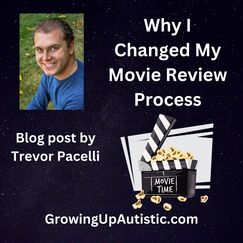 When I was in college back in 2014, I created my movie review blog, TrevorsViewOnHollywood.com, because I found during that time how much I enjoyed talking about movies. So whenever I went to see a new movie, I wrote a review on it and posted it on my blog. At that time, it all seemed to be going fine as a hobby, as there was some generally good feedback about it from friends and relatives. Then when I left college, I started working for my parents’ company, Consetta Group, where they worked with me to develop my own personal businesses, which included my movie reviews. I started to get more serious about it and tried monetizing it further, posting a new review every Friday, which likewise meant seeing a new movie in theaters every week. It was pretty exhausting, especially when I had to see movies I otherwise would never have wanted to see, but this format of reviewing movies motivated me to construct my own elaborate system for grading movies that I continued to perfect and master over the next several years. It helped me improve my ability to assess whether a movie was well-made or not. During this time, I was also heavily dedicated to following the Oscars, which included making predictions each year as to what would be nominated. I kept this up by posting a new review for a new release every Friday even after I left Consetta Group, and for a while, this all seemed quite effective. But then COVID-19 hit. Movie theaters closed. I couldn’t post a review for a new weekly release anymore. At first, I decided to review older classic films, with some direct-to-streaming releases mixed in, but as the months passed with movie theaters still being closed, I was losing my drive to review movies. Even when the vaccine became available, movie theaters opened back up, and life slowly went back to normal, my old passion for reviewing movies was gone. It started to feel like a chore to have to keep up my commitment to posting a new review week after week, and I hated having to sit through the big popular movies that I already knew going in were going to be bad. It didn’t help either that I was losing my respect for the Academy of Motion Pictures. I knew already that they nominated films based on campaigns and not based on filmmaking quality, but leading up to the 2022 ceremony, they were making horrifically insulting decisions to try and bring viewers back. Their decision to remove several of the categories from the live show was the straw that broke my camel’s back; I officially decided that for the first time in six years, I was going to boycott the ceremony. Upon looking back, I made the right decision. So that was one more step forward to dropping this hobby that was no longer fun for me. Yet here’s another thing: having to talk about badly-made movies affected my optimism outside of the hobby. My big “come to Jesus” moment was when I shared a pretty tasteless joke on Facebook about the Depp vs. Heard trial and was called out for it, which convicted me of how writing constant negative reviews for the popular movies was damaging my optimism throughout the day. So I gave it up. I never again posted on my blog. No longer did I feel pressured to see all the new Marvel movies or Disney live-action remakes. No longer did I have to bring a notepad into a movie theater and struggle to see what I was writing in the dark. I was free to watch what I wanted when I wanted. I was free to watch nostalgic guilty pleasures of mine, such as the 2002 Scooby-Doo movie, or older movies I was interested in checking out, such as Bedknobs and Broomsticks. I’m also free now to go to the movie theater on my own terms and watch movies I want to see. So out of my own free will, I saw both M3GAN and The Super Mario Bros. Movie; although neither was what I would consider “good,” I had a fun time with both of them. Then during the week of “Barbenheimer,” I decided to go see both Barbie and Oppenheimer. While I hated sitting through Oppenheimer, I was pleasantly surprised by Barbie. So it was worth joining in on the popularity bandwagon this one time so I could then join in on a conversation I wanted to be a part of. I am currently writing mini-reviews of movies I have seen in the past, and categorizing them to make it easy for people to find something to watch for fun, or other moods. They can be found on Instagram and on our Pacelli Publishing website. Overall, I can’t even imagine going back to my commitment of reviewing one new movie a week on an elaborate grading scale. I’m much happier this way. To learn about movies that depict disabilities, check out my book, What Movies Can Teach Us About Disabilities.
1 Comment
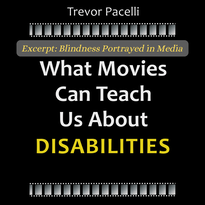 By Trevor Pacelli In thinking back to my childhood, I don’t recall knowing of any blind people at school or anywhere else; my only exposures to the blind community are limited to three media properties: The first is a blind girl named Marina from the hit TV series Arthur, who made a couple of appearances as the friend of a character named Prunella. One of those episodes taught kids the dos and don’ts of treating friends with disabilities, such as not trying to be too helpful unless they specifically ask for help. The second is from Pokémon: Ruby Version; in this game, there were three ultra-rare Pokémon, Regirock, Regice, and Registeel, who needed to be obtained by decoding a series of puzzles with braille descriptions. Being the Pokémon geek I was back in sixth grade, I was so desperate to get to these three legendary beasts that I made my mom drive me to the library to check out a book on translating braille… only to find out the dictionary we had at home already had a braille translator! Whoops! The last is Toph, the blind earthbender from Avatar: The Last Airbender. She used earthbending (or moving rock and dust with her mind) to create a mental picture of her surroundings by using the ground’s vibrations felt through her bare feet. Back then, I didn’t care much about her, mostly because I was a dweeby tween who believed her blindness made her incomplete. Later as an adult, I rewatched the whole series on Netflix, and Toph essentially became my favorite character, not just because of her rough n’ tough personality, but also because of how she turned her disability into an advantage to become “the most powerful earthbender in the world.” Ultimately, I was a pretty privileged kid back then who wasn’t able to consider the struggles of the blind community, which was much different from what I’ve learned in my research for this book. For instance, I discovered that when seeking out accommodations, blind people often lack authority when requesting accommodations from schools and workforces. Among those blind people raised by sighted parents, it’s common for their parents to think little of what their supposedly handicapped child can accomplish, in turn depriving them of fruitful experiences. Read more about the portrayal of blindness in film and media in my book, What Movies Can Teach Us About Disabilities. 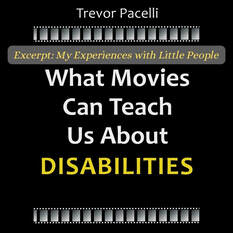 --by Trevor Pacelli I remember loving The Wizard of Oz as a kid. The munchkins scared me back when I was four because at the time I didn’t understand that some people have a condition that makes them smaller than usual. While it wasn’t enough to scare me out of watching the movie, the small people with disproportionate body parts and plastic hair singing like they were on helium left an unpleasant impression on my toddler self. I was always happy whenever it got to the part when Dorothy left Munchkinland because it meant the scary part was over. Throughout the rest of my childhood, television and film were the sole influences that exposed me to anyone shorter than five feet. I saw so many little people playing roles where their height demanded it that I became numb to it. Such roles from movies I used to love included the goblins from the Harry Potter movies, some of the whos from How the Grinch Stole Christmas, the Oompa Loompas from Charlie and the Chocolate Factory, and many funny TV commercials where a little person played an elf, troll, or any other little fantasy creature. Then of course there was the famous, “He’s an angry elf” scene from Elf that still has me on the floor laughing even after the hundredth viewing. The few times I did meet someone in person with dwarfism, my treatment of them fell much more on the dark side. I remember in my sophomore year of high school when I constantly made fun of a cheerleader who (I guess) had dwarfism, with a shoe size of only two. I wasn’t the only one: one student asked her, “Do you need a ladder to pick up a penny?” She also was teased for being able to fit inside a locker. Looking back, I’m so sorry I stooped low enough to join in on the bullying of her and other peers who were shorter than average. My exposure to various media was a massive influence on my belief that little people should be the butt of every joke, and are only half-human (no pun intended) compared to a person of average height. My book, What Movies Can Teach Us About Disabilities, sheds light on negative and positive stereotypes and representations of little people in the movies. Check out my book to learn more about how to better understand 10 different disabilities. Honest thoughts from 30-year-old Trevor Pacelli, adult with autism and author of What Movies Can Teach Us About Disabilities, Six-Word Lessons on Growing Up Autistic, and illustrator of The Kindergarten Adventures of Amazing Grace. See all of his books at TrevorPacelli.com I don’t want to be known as somebody with autism, I don‘t want to be known as autistic, I want to be known as just Trevor. Despite the "disability pride" stuff I see everywhere, I'm among the minority who hates my autism and wishes there was a cure; while my heavily organized mind and wild imagination are great bonuses, I would give that all up in a heartbeat to enjoy relationships the same as everybody else. Social Anxiety My anxiety most kicks in during social situations, even little ones like sudden small talk. If I pass by a stranger on a street and s/he says to me, "hi," I internally freak out because then I must abruptly transition out of my mind to say words. Part of that could come from stressful interactions I’ve had in trying to talk with people who have foreign accents and don’t speak English too well, it’s harder for me to understand them, and it only got harder during the COVID-19 mask mandate. It's equally as hard for me to look the other in the eye while I’m talking to them because knowing that they’re staring into my soul as I speak builds up inner pressure akin to that of stage fright. It makes sense for me that I have this problem considering my speech delay—while an idea may float around in my head, it takes longer for my tongue to adapt that image into words. My speech pattern mostly involves me pausing to come up with the right word until the other person just finishes my sentence for me, and when telling a story, the events would usually be told out of sequence. So if a stranger approached me for directions, I often say, "Sorry, I can’t help you" because of my incapacity to put my thoughts into words or even remember street names. Lately, my anxiety attacks have gotten to the point where I get one for no apparent reason and become physically unable to speak. One time, I retreated into the bathroom away from the social group I was in, and for around a half hour I fought against myself to walk back out—just reaching for the doorknob felt impossible because some invisible force kept pushing me back. Stimming The Merriam-Webster Dictionary definition of stimming: "Behavior that is marked by a repetitive action or movement of the body (such as repeatedly tapping on objects or the ears, snapping the fingers, blinking the eyes, rocking from side to side, or grunting) and is typically associated with certain conditions (such as autism spectrum disorder)." Usually, people who stim are unaware of their behavior unless someone else points it out to them, and I’m no exception as I do it constantly throughout the day. I may knock my knee, rock forward and back, wrap the hoodie string of my sweatshirt around my fingers, tear apart napkins and used coffee cups, repeat phrases to myself out loud, or flap my hands. The stims happen most often during the ever-so common event when a painful memory pops up in my head, and I make some random unexplainable lip and hand gestures to fight off the mental pain. You can imagine how I would always have difficulty sitting still or doing other things that require stillness, such as praying. Sensory Issues Besides talking, my autism also affects my sleep, to the point when a night of a full seven or eight hours of sleep is an extreme rarity. Often, if I'm on vacation, it takes hours to fall asleep, and I then wake up hours before the sun rises, especially if I have to sleep on the couch. It’s one of the reasons why travel is so anxiety-inducing for me; among the other reasons include the change in routine, weather, and time zone, not to mention being around people for hours on end. Camp was worse though; while vacations can be planned right down to the bathroom breaks, at camp, everything’s designed to be spontaneous. For the most part, camp leaders seldom ever tell the campers what to expect each day; one time, I along with the other boys were forced without warning to spend the whole night sleeping outside in a tent in the snow. It was supposed to be a lesson about the challenges we must take on as men, but I just kept panicking about how cold and numb I was and wanted so desperately to go home. Camp also forced us to stay up late and wake up early, and the games were all very physical and loud. Plus, the faraway locations of the camps often had extreme temperatures, and the buses transporting us always broke down, causing us to arrive many hours later than originally planned. (One time, the snow conditions were so bad that we had to stay at our campsite a full extra day as we waited for buses to arrive and drive us home.) So since most kids with autism find so much security in routine and predictability, a camp could be counterproductive to helping them grow. Special Interests I had several special interests growing up, some of which I’m not proud of for being transfixed onto. Those included:
As for Pokémon, did you know that its founder, Satoshi Tajiri, could be autistic? It would make sense because the series’ concept of exploring a fantasy world that one could customize with their team of cute little creatures has a lot of appeal to kids on the spectrum (and adults on the spectrum at that). Yet the franchise has been so near and dear to me after all this time mostly because I love to design my own Pokémon. That itself is an entire branch of fans in the Pokémon fandom, known as the “Fakémon” community, which furthermore gives me a sense of belonging somewhere. So I now run my own Fakémon Instagram account: @murro_region. High School Every time the teacher from any of my classes told the students to form groups for a project, I was that student who needed to have my team picked for me because everyone else already made their picks with their closest friends. When breaking into groups of two, I always ended up in a group of three, had to work with the teacher, or had to do the project by myself. This happened even if I had others from my social clique in my class who called me their friend. They would always save seats in advance for their much closer friends, and I would ask, "so where am I supposed to sit?" and they would then tell me, "you can sit anywhere you like." This meant I never got the privilege of getting to sit close to the ones whom I most wanted to develop friendships with, inside or outside the classroom. These "friends" of mind didn’t even care if their shoving me aside meant I had to eat at a table by myself, as long as they got to sit with their own closest friends. After school would end, and I was talking with them in the hallway, they would often say to me, "We’re going to go hang out somewhere now. See ya!" I never got an invitation to join in, even though I had the time to do so. Although they told me they appreciated me and valued me and considered me a good friend, their actions instead gave me the impression that they secretly preferred if I wasn’t around, and were just politely tolerating my presence. High school was made up entirely of me watching the other kids from my social clique become the center of many running jokes, but a running joke (or even a standalone joke) about me was never made. At the time, Facebook was at its most popular, meaning my high school experience was made all the worse by the photos of them all having fun together without me, which gave me a horrible case of FOMO (fear of missing out). School dances were the worst part of it because no girl ever wanted to be my homecoming date, and no girl ever asked me to any of the tolo dances. Although I did find a date to my senior prom and did join a group, the shoving aside of me only continued, as while they all got to carpool together, my date and I were by ourselves in my car. Then my date had to leave the dance early, so I was alone on the car ride back. Looking back, I wonder if it was a waste of time and money for me to go to my prom and if I was better off staying home. However, I will admit I had a few toxic traits back then. I was so depressed more days than not, and I resorted to spreading my bad mood to everyone else, in hopes that they’ll show me pity and ask me what was wrong. Stuff like that humbles me and makes me think, "no wonder nobody wanted me around!" Not that it excuses their treatment of me, because to this day I still consider high school to be the worst years of my life; had it not been for my Christian faith, I would have killed myself at some point during that time. It's Better Now! Yet later in my adult life, once I began to take daily medication, I saw an enormous improvement in my well-being. Perhaps the most therapeutic thing for me has been living with a pet, seeing how I was so close with the family cat as I grew up. Four years after the cat passed away, I decided it was time for me to get a pet of my own as a source of self-therapy. Now, I am the proud dog father of an adorable little terrier-mix, and since then, my suicidal thoughts and deep pits of depression have been almost nonexistent. Greater still, my quality of friendships has improved. I found friends at my local church who put in their best effort to accept me for who I am and treat me as an equal. They know me as the food, movies, and pun guy, and always refer to me when they want to know my opinion about a movie or hear about a weird combo of foods that they think sounds like something I would try to make. Once, one of them even sent a text message with a pun to one of the others, and the other responded, "Haha, you just pulled a Trevor!" That in particular meant a lot to me because it was a sign of me finally gaining the acceptance in friendship I’ve wanted and needed since high school. So while I prefer if I wasn’t autistic, and it will always provide challenges for me until the day I die, the fact that progress has been made is a testament to readers like you about the humanity of anyone with a disability. In terms of interacting with people like me, here are some things to know: Talking to Others with Autism Don’t:
Learn more about Trevor at TrevorPacelli.com
|
Inspiration for Life with AutismThis blog has a variety of articles about people living life with autism, and topics and ideas that can help in the journey. Guest bloggers are welcome. Inspired by Trevor, a young adult film critic, photographer and college graduate on the autism spectrum. Categories
All
Archives
July 2024
|
Proudly powered by Weebly
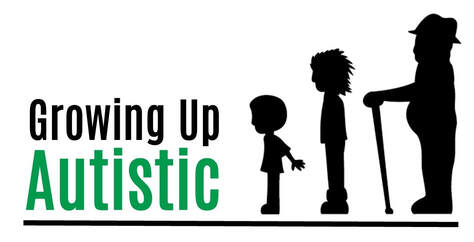
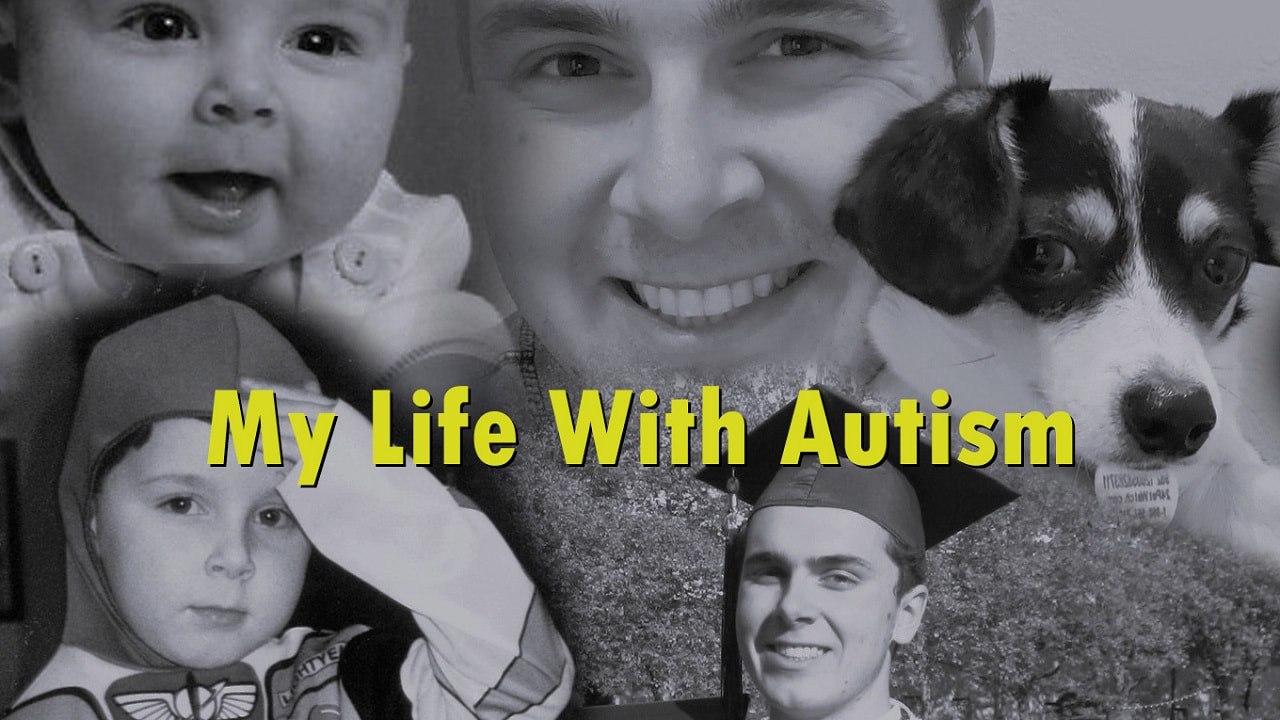
 RSS Feed
RSS Feed